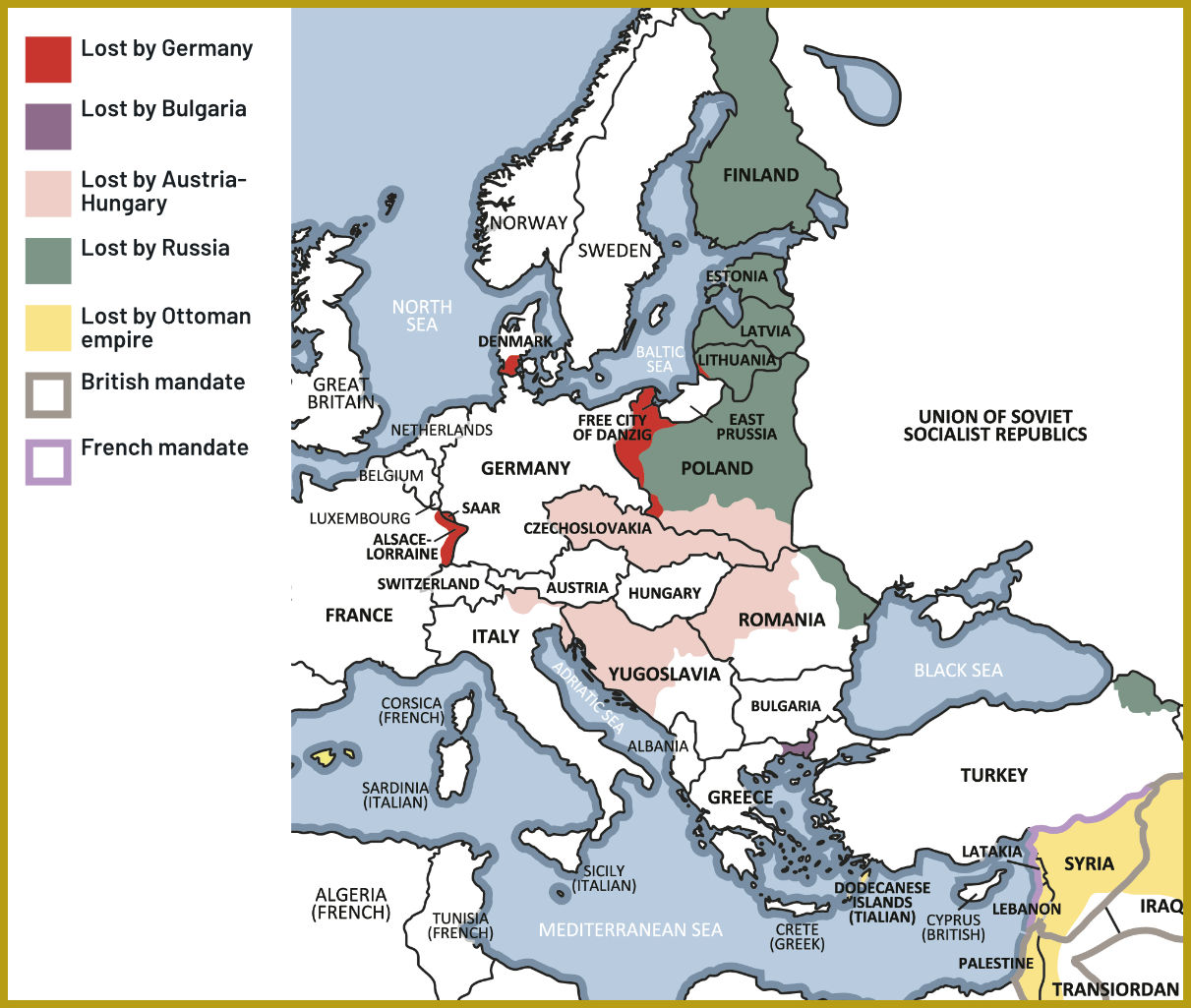1. Rivalries and antagonistic alliances
Chancellor Otto von Bismarck had kept the European balance of powers under German supremacy thanks to his diplomatic ability to isolate France, to maintain a peaceful relationship with Great Britain, and to avoid a conflict with Russia. The ambitions of the new emperor or kaiser, William II, led to the end of this international political balance.
A system of hostile alliances was consolidated. On the one hand, the Central Powers: Germany tightened its traditional links with Austria-Hungary, and Italy (as a reaction against the French occupation of Tunisia, one of its colonial objectives) joined them in the Triple Alliance. On the other hand, the Allies were France, Russia (looking for support against Austria and Germany) and Great Britain: they formed the Triple Entente.
The reasons for this alignment can be summarized as follows:
. Tension between France and Germany. A nationalist desire of revenge existed since the French defeat in the Franco-Prussian war and the loss of Alsace and Lorraine.
. Naval and economic rivalry between Germany and Great Britain. During the second industrial revolution, Germany had surpassed the British industrial capacity. Both countries started a naval race, looking for a strategic maritime superiority.
. Territorial tension between Russia and Austria-Hungary. The Balkan region had been a point of friction, since both empires sought to enlarge their territory against a weak Ottoman empire (the "sick man" of Europe). Instead, they supported the different new Balkan States in order to strengthen their own position. Russia supported a pan-Slavic movement to unite all Slav peoples against Austria. Actually, the tsar (or Russian emperor) backed up Serb dreams to create a Great Serbia, which was a direct threat for Austria-Hungary.
2. Crisis leading to the war
a) Moroccan crisis. Germany wanted to expand its empire in one of the remaining areas free from colonial domination. Germans did not seek to build a great colonial empire during the government of Bismarck, but now the new emperor wanted Germany to have "a place in the sun". Kaiser William II declared in 1905 that he would help the sultan to maintain Moroccan independence; after the Conference of Algeciras and the subsequent Spanish and French occupation of Morocco, in 1911 a gunboat was sent to Agadir to put a pressure on France. Finally, thanks to the British support to France, Germany recognized the French protectorate in Morocco in exchange of a territory close to Cameroon.
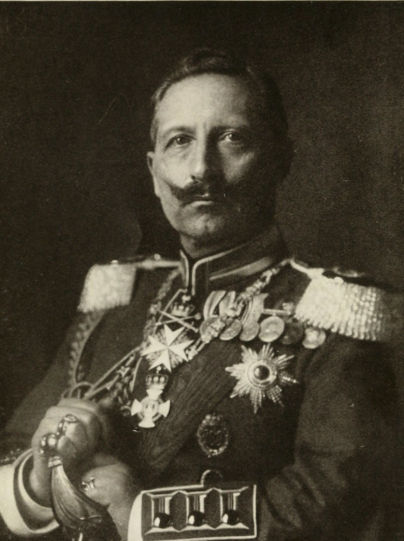
Wikimedia Commons
b) Balkan crisis.Bosnia-Herzegovina was annexed to the Austrian empire in 1908. This was in direct opposition to the Serbian will to create a Great Serbia and to integrate all Serbs in one single State. Russia did not move forward because Germany made it clear that it would back Austria, but the tsar decided not to let the Germans repeat this humiliation.
On the other hand, two Balkan wars had resulted in an increasing tension between the alliances. In 1912 the Balkan League (Serbia, Greece, Bulgaria and Montenegro) attacked and defeated the Ottoman Empire, consequently enlarging the territories of the allied countries. But Bulgaria was not satisfied with the Serbian acquisition of Macedonia, and started a new war in 1913 against its former allies and Turkey; the potential intervention of Austria to support Bulgaria meant the enmity of Rumania. The subsequent peace limited the territorial gains of Bulgaria, and the creation of the new State of Albania (backed by Austria) frustrated the Serbian access to the Adriatic Sea.

3. The War
The First World War broke out precisely in the Balkans. On June 28, 1914, the heir of Austria-Hungary, archduke Francis Ferdinand, was assassinated in Sarajevo (the Bosnian capital) by a Serbian-Bosnian terrorist, Gavrilo Princip. Immediately Austria blamed Serbia, sent an ultimatum, and finally declared the war. In support of Serbia, Russia ordered a general mobilization against Austria and Germany, and consequently Germany declared war on Russia (August 1) and France (August 3), and invaded Belgium in a strategic movement towards Paris. Formally in response to the violation of the Belgian neutrality, Great Britain declared war on Germany. The Great War had begun.
The Western front. Germany followed the Schlieffen Plan, according to which the German army needed a quick defeat of France in order to move afterwards against Russia (the problems of deployment and transportation of the tsarist troops were well known). As a matter of fact the Schlieffen Plan failed, and the German invasion was stopped 32 km from Paris at the battle of the Marne (September). A double line of trenches was dug from the English Channel to Switzerland. Both the German and Allied armies tried to advance, breaking the line of trenches through massive attacks concentrated in specific points, without success. One of these attempts was the battle of Verdun, due to a German initiative; another one was the battle of the Somme, an Anglo-French attack. Both failed in 1916 with thousands casualties.
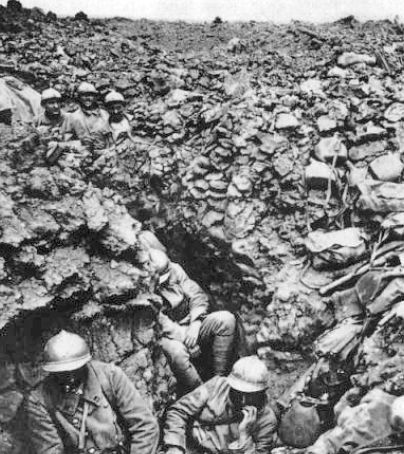
Wikimedia Commons
Italy entered the war against the Central Powers in 1915 (as it was eager to obtain Libya from the Ottomans and because of the Allies promise of Austrian territories), but its army did not represent a significant advantage to the Allies.
The Eastern Front. Russia invaded Eastern Prussia, but was soon defeated by the German army, which helped Austria to reject tsarist troops; actually Germany penetrated deeply into Russian territory, while Serbia and Romania were occupied. The Ottoman Empire entered the war on August on the side of Germany.
The collapse of the Russian army fuelled the opposition to the tsarist government, and eventually finished in the October revolution. The first decision of the Bolshevik government was to get Russia out of the war. The treaty of Brest-Litovsk recognized in 1918 the independence of Finland and renounced to Poland, Estonia, Latvia and Lithuania.
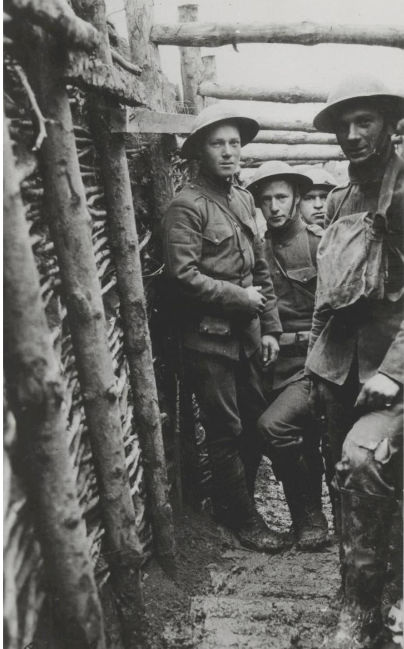
Wikimedia Commons
The Great War was the first "total war" in History. All citizens, not only soldiers, were affected, since it was necessary to mobilize all national forces against the enemy. States centralized and strengthened their power in order to organize resources effectively. Millions of people were sent to the battle lines after mass conscription. Governments, even the traditionally liberal ones, suspended free market economy and planned industrial and agriculture productions, intervened prices and wages and controlled means of transport. Women left their traditional place at home for new jobs at the "home front".
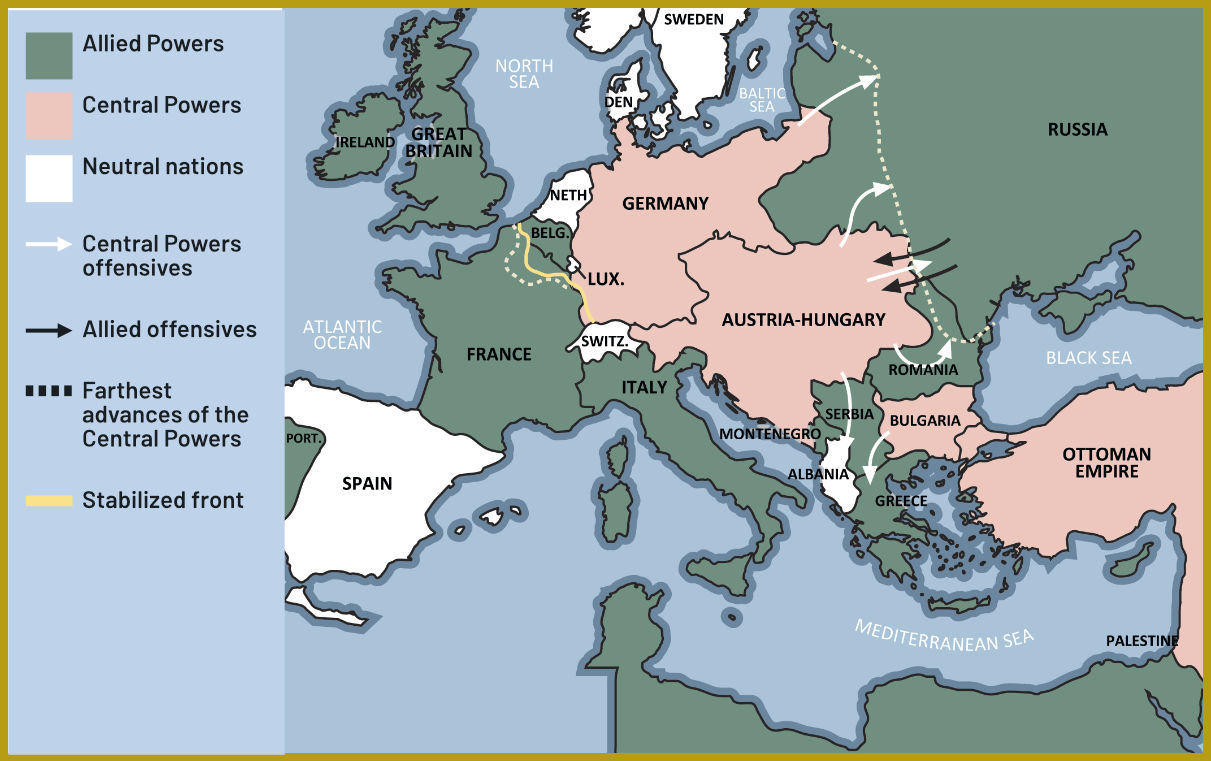
4. The end of the war and the peace settlement
The American entry into the war on the Allies side was decisive for the defeat of the Central Powers. The USA came into war because their strong links with the British. The naval blockade on Great Britain led to unrestricted attacks of German submarines against any suspected ship. Since the sinking of the Lusitania in 1915 (a British passenger boat with more than one hundred American citizens,) American public opinion turned in favour of the war, which was declared against Germany in April 1917.
American industrial power and fresh troops were able to break all war fronts against the Central Powers. Bulgaria, the Ottomans, and Austria capitulated, and finally Germany accepted an armistice on 11 November 1918.
In 1919, the victorious powers met in Paris to settle the terms of the peace. Defeated nations were not allowed to participate, so that the Peace Treaties were decided mainly by the USA, France and Great Britain. The influence of American president Woodrow Wilson was crucial to apply the principles of his Fourteen Points, a speech addressed to the American Congress in which self-determination for emergent nations was encouraged. That meant the creation or recognition of new States from the disintegration of Austria-Hungary and Russia: Czechoslovakia, Poland, Finland, and the three Baltic Republics. Serbia was rewarded with the creation of the new kingdom of the Serbs, Croats and Slovenes (Yugoslavia).
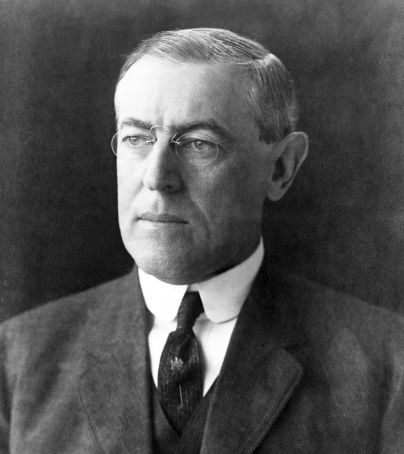
Wikimedia Commons
On the other hand, Wilson was a strong supporter of an organization able to solve international disputes and to maintain world peace. The League of Nations was created in order to ensure a lasting peace through collective security (military or economic sanctions imposed collectively to an aggressor State). A General Assembly, composed by representatives of all member States, would decide on general matters, and a Council dominated by the four victorious powers (Great Britain, France, Japan and Italy) as permanent members plus a number of non-permanent members, would solve the international disputes. As a matter of fact, the League failed to fulfil its objectives. The American Congress refused to ratify the Covenant of the League, so the USA did not participate in the international organization; moreover, Germany and the USSR were only allowed to join in 1926 and 1934.
1. (.) diplomacy shall proceed always frankly and in the public view.
2. Absolute freedom of navigation upon the seas (.)
3. The removal, so far as possible, of all economic barriers and the establishment of an equality of trade conditions among all the nations consenting to the peace and associating themselves for its maintenance.
4. Adequate guarantees given and taken that national armaments will be reduced to the lowest points consistent with domestic safety.
8. All French territory should be freed and the invaded portions
restored, and the wrong done to France by Prussia in 1871 in the
matter of Alsace-Lorraine, which has unsettled the peace of the
world for nearly fifty years, should be righted, in order that
peace may once more be made secure in the interest of all.
10. The peoples of Austria-Hungary, whose place among the nations we wish to see safeguarded and assured, should be accorded the freest opportunity of autonomous development.
11. Romania, Serbia, and Montenegro should be evacuated; occupied territories restored; Serbia accorded free and secure access to the sea (.)
12. The Turkish portions of the present Ottoman Empire should be assured a secure sovereignty, but the other nationalities which are now under Turkish rule should be assured an undoubted security of life and an absolutely unmolested opportunity of autonomous development (.)
13. An independent Polish state should be erected (.)
14. A general association of nations must be formed under specific covenants for the purpose of affording mutual guarantees of political independence and territorial integrity to great and small states alike.
Fourteen Points Speech by W. Wilson
January 1918
Five separated treaties were signed with different countries, although the most important of them was the Treaty of Versailles with Germany:
. Germany and Austria were considered responsible for the war, and compelled to pay huge war reparations;
. German army was reduced to 100.000 soldiers;
. German colonies were shared between Great Britain and France;
. the border region of Rhineland was demilitarized;
. Alsace and Lorraine were returned to France;
. part of the territory of Prussia (the Polish corridor) was ceded to Poland.
All this was considered a dictated peace in Germany, and created a strong feeling of revenge.
